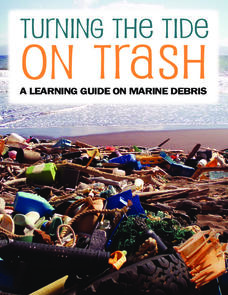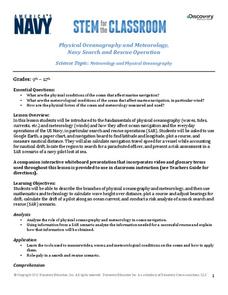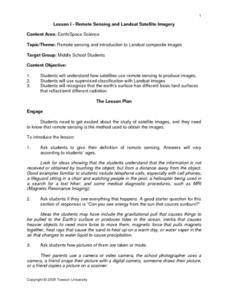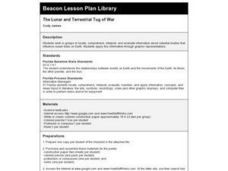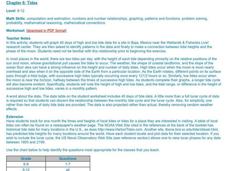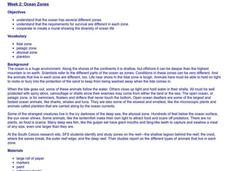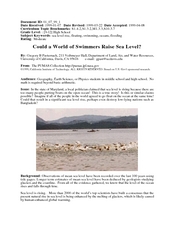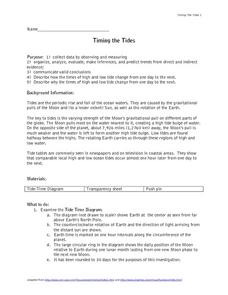Curated OER
Regents High School Examination: Physical Setting Earth Science 2006
Test your class on earth science with this extensive resource. This test, created by The University of the State of New York Regents, is made up of 50 multiple choice questions and 32 short answer questions that cover the branches of...
Centers for Ocean Sciences
Ocean and Great Lakes Literacy: Principle 1
Is your current lesson plan for salt and freshwater literacy leaving you high and dry? If so, dive into part one of a seven-part series that explores the physical features of Earth's salt and freshwater sources. Junior hydrologists...
Curated OER
Tides - The Ins and Outs of Tides
Get your junior oceanographers to generate tidal prediction graphs on an interactive website. They will feel like experts in the field, or shall we say, experts in the ocean! This is a brief, but worthwhile activity that could be used to...
NOAA
Tides
Low tides, high tides, spring tides, neap tides, diurnal tides, semidiurnal tides, mixed tides ... just how many types of tides are there? The 10th installment of a 23-part NOAA Enrichment in Marine sciences and Oceanography (NEMO)...
Curated OER
Motion in the Ocean
How does the formation of currents and waves in the ocean happen? High schoolers will learn about the primary causes for ocean currents and waves by calculating a wave's amplitude and nautical mile speed. Then they will complete a...
Curated OER
Tides & Lunar Cycles
Students demonstrate how the moon affects the tides, a neap tide, and spring tides by using their bodies as models. After students observe the model they created, they draw and label the diagram on a provided worksheet. They then log...
NOAA
Turning the Tide on Trash: A Learning Guide on Marine Debris
The lessons in this learning guide are designed to increase youngsters' awareness of the impacts of marine debris and to teach them about pollution prevention techniques. This fabulous, 30-page packet is chock full of important...
Curated OER
Properties of the Ocean
Students participate in a problem-solving activity, that includes Internet research, about how energies such as currents, waves, tides, etc. affect the ocean.
Curated OER
Tide Types
Students record hourly reading for water height for 24 hours and determine whether a location experiences diurnal, semi-diurnal or mixed tides. Links are present for the information. Students predict high and low tide, and answer a set...
Curated OER
Tides
Students discover how the position of the Sun, Moon and Earth affect tides. In this science instructional activity, students view a presentation about the tides. Students discuss the different types of tides.
Curated OER
The Tides
Students experience a computer based applet that explains why the Earth experiences tides.
Curated OER
The Tides-Ups and Downs
Students investigate tidal patters and the forces that cause the tides. In this tidal lesson plan, students explore and research the tides and complete 43 questions about the causes of the tides, how they are monitored and measured and...
Discovery Education
Physical Oceanography and Meteorology, Navy Search and Rescue Operation
It's an ocean rescue mission! Groups must find a pilot downed off the coast of the Chesapeake Bay. Rescuers must determine the distance needed to travel as well as the heading to get to the pilot's last known position. Taking...
Curated OER
Remote Sensing and Landsat Satellite Imagery
Middle schoolers comprehend how satellites use remote sensing to produce images. They use supervised classification with Landsat images. Students recognize that the earth's surface has different basic land surfaces that reflect/emit...
Curated OER
Why is There a Tidal Bulge Opposite the Moon?
Students simulate how the Moon causes ocean tides. In this earth science lesson, students calculate gravitational acceleration using a mathematical formula. They compare the force of attraction between the Earth, Moon and Sun system.
Curated OER
The Lunar and Terrestrial Tug of War
Fourth graders, in groups, locate, comprehend, interpret, and evaluate information about celestial bodies that influence ocean tides on Earth. They apply this information through graphic representations.
Curated OER
The Intertidal Zone: Tide and How Creatures Survive
Learners explore oceanography by completing science worksheets. In this tide pools lesson, students discuss the forces of the tide pools, the animals that live within them, and the impact they have on the rest of the ocean. Learners...
Curated OER
Ocean Currents and Sea Surface Temperature
Students use satellite data to explore sea surface temperature. They explore the relationship between the rotation of the Earth, the path of ocean current and air pressure centers. After studying maps of sea surface temperature and ocean...
Curated OER
The Tides of Change Worksheet (Part 1)
In this science worksheet, 1st graders track the tides of the ocean for a number of days and examine the data to determine the meaning of the pattern.
Curated OER
Tides
Students graph 40 days of high and low tide data for a site in Baja, Mexico near the Wetlands & Fisheries Live! research center. They identify patterns in the data and finally to make a connection between tidal heights and the phase...
Curated OER
Ocean Zones
Students create a mural showing ocean zones and the diversity of ocean life. They use reference books to create a list of plants and animals that would live in each zone.
Curated OER
Ocean Currents
Fourth graders work in groups to research ocean currents and create posters with their findings. They locate the patterns and names of major ocean currents and identify them on a map. Students also use red pencil to show ocean currents...
Curated OER
Could a World of Swimmers Raise Sea Level?
High schoolers determine the volume of water they displace. In this earth science lesson, students calculate the total water displaced by the world's population. They evaluate whether or not this value is enough to raise the sea level...
Curated OER
Timing the Tides
Students collect data and describe how and why the high and low tides change from day to day. In exploring tides lesson students study tides by taking notes, recording data and analyzing their findings.






